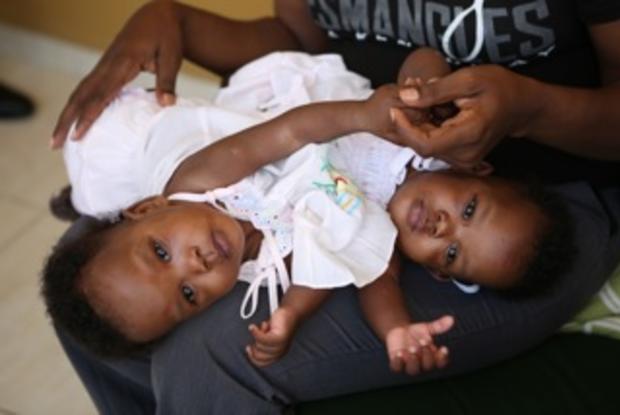Conjoined twins separated in first for Haiti
Six-month-old twin girls are recovering well after becoming the first conjoined twins ever separated in their home country of Haiti.
The girls, Michelle and Marian Bernard, were born in November connected at the abdomen. They also have a separate triplet sister, Tamar. "They capture your heart," said CBS News chief medical correspondent Dr. Jon LaPook, who was there for the surgery. "The first time I saw them, they're holding each others' hands."
Their parents learned 23 weeks into the pregnancy that the babies would have a problem Haiti's health care system was ill equipped to handle. That set off an unprecedented international effort to get the babies the care they would need to live normal, healthy lives.
Five years after Haiti's devastating earthquake, "This is a country that's trying to rebuild the health care system," LaPook said. "'Rebuild' what never really existed in the first place. And the thought of doing a sophisticated operation like this would have been absolutely unheard of."
So he said an "incredible dream team" of doctors was assembled to perform the surgery, led by Dr. Henri Ford, the chief of surgery at Children's Hospital Los Angeles. Ford himself is a native of Haiti who moved to the U.S. in his teens and now makes frequent return trips to treat patients in his homeland.
Rather than fly the babies to an American hospital for treatment, the decision was made to keep them close to home to make the process easier on the family and help develop the Haitian medical community.
The 7-hour-long operation took place on May 22 at the University Hospital of Mirebalais, Haiti's most advanced medical facility, which was built as a public-private partnership between the Haitian government and Partners In Health, the aid group founded by Dr. Paul Farmer.
Making this complex surgery possible and giving the twins separate lives was not the first time their family has beaten the odds. The babies' father, David, survived the 2010 earthquake after spending 7 days trapped in the rubble.
The surgery itself "was very dramatic," LaPook said. The operation was going fine, "and then suddenly Michelle's blood pressure dropped, precipitously and dangerously. And what was happening was, there was still a connection in the liver. Michelle had been getting blood from Marian, and now that was being cut off. At the same time, when they tried to give transfusions and fluids, that was all going back to Marian. The answer was to separate them, and make that separation complete as quickly as possible."
The operation was a success, and LaPook believes its impact will be felt far beyond the two little girls and their family. "Long after the twins are home -- which they are now, perfectly healthy -- and long after the surgical team returns to the United States, there's going to be something left in Haiti, which is a [medical] team that now has confidence, has expertise, will now be able to do more sophisticated operations in the future."
Watch the video above as Dr. LaPook explains more about the dramatic surgery and what went into making it happen, and see his full report on the CBS Evening News. There will be more of the story on CBS Sunday Morning June 7.
